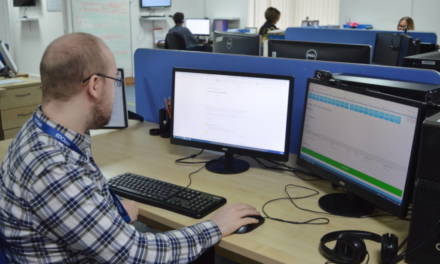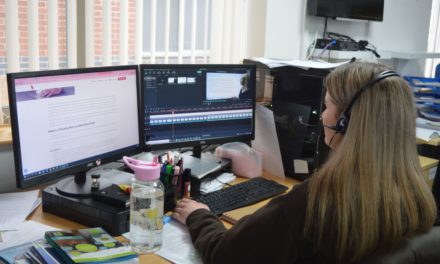The apprenticeship is done through EDLounge and work is done through EDClass. I had officially started the apprenticeship on the 31st of January though I have been with EDClass for a short period before, as the company very kindly offered a trial to ensure this position was the right one for me. I am expected to complete the apprenticeship within the next two years.
I had found EDClass through a job fair that was hosted at the New York Stadium in Rotherham, which was suggested to me by the support provided with Universal Credit. Hesitant, I entered the room and eventually sat in front of Paul and Archie. I had a pleasant discussion about myself and the business, provided my details—and the rest is history.
They must have liked me because I was invited for an interview shortly after, which thankfully I was successful. I believe in this especially because I’m passionate about learning and honing my craft as well as improving the education sector as a whole.
I absolutely sympathise with everyone who is nervous in making that leap into the line of work for the first time, as I was. There’s no shame in that. Here’s a quick word of advice: know that anxiety isn’t a negative trait nor will it be taken as one by your peers. Personally, it’s the first step into the unknown that I find the most difficult to take, but thinking about the benefits later down the line is what helps me soldier on through tasks I would otherwise rather avoid.
A difficult choice to make
Before then, I was a university student. University felt like a natural progression to school and college as it was the only path anybody around me ever talked about. This isn’t to say I regret going—I had met some wonderful people there and learnt a lot of incredibly useful skills from both the Computing course I was on and the general life lessons I was encouraged to pick up alongside the studying including organisational skills, team building and how to research effectively.
I had decided to leave shortly before the final year primarily because COVID-19 had resulted in the course changing to a more isolated environment which I personally found too difficult to immediately transition to.
The final year was also a shift into heavy programming as opposed to the more mathematical and theory-based computing I enjoy; programming and coding is something I would prefer to keep as a hobby than as something to dedicate 40+ hours a week to, lest it stops being enjoyable. This newfound downtime allowed me to explore other avenues until I discovered just how complimentary an apprenticeship would be to somebody in my position. I wish I had explored them sooner.
Software testing is an engaging apprenticeship
Software testing’s core is untangling, reinforcing and growing a business’ systems to ensure users yield as much from them as possible. Our job is to maximise efficiency by reducing time spent on bug reports, ensuring customers and staff alike can complete the steps they wish to complete as easy and as quickly as possible, so that in future that time can instead be spent developing the business further.
There are multiple reasons I find this stuff enjoyable: first and foremost, it’s creative. Seeing ideas come to fruition through your vision, then seeing your fellow co-workers incorporate that into their daily routines makes it all the more satisfying. Some bugs may also require a creative solution to solve, when the answer is not immediately obvious. In a sense it’s quite mathematical finding patterns and discovering what changes in x result in an unintentional change (if any) in y. The job is also fairly varied given the number of systems I’m working with, with not only EDClass but its sister companies as well. There’s grunt work when a task requires a lot of combinations to try, of course, but no two days are spent the same so it doesn’t feel at all monotonous.
Embrace the learning stage
I’ve learnt a great deal about software testing in the few months I’ve been here: concepts, techniques and tools that help collate test results more effectively—but I would say my largest developments thus far have been more administrative and social. Effective communication and attention to detail is a must in this role as development ideas and bug reports need to be understandable/replicable to absolutely anybody who reads it be it fellow team members, the developers or the senior management. This naturally improves organisational skills as well, as both tie into good structuring.
I’ve been able to learn as much as I have this quickly because everybody in the business, including senior management, has shown kindness and patience and has allowed me the space to study and revise. Sam, the CEO, has even gifted me a few online courses of my choosing that I have found incredibly useful learning from. This to me shows passion and care from staff and management in wanting me and the other apprentices to pass with flying colours, and for that I couldn’t be more thankful.
I hope that after I prove myself by perfecting my endpoint assessment and completing my apprenticeship, I can lead by example and share with newer apprentices the knowledge, tips and tricks I’ve learnt. I hope to convince any person reading this who is unsure of what to do next to really give apprenticeships some genuine consideration.









